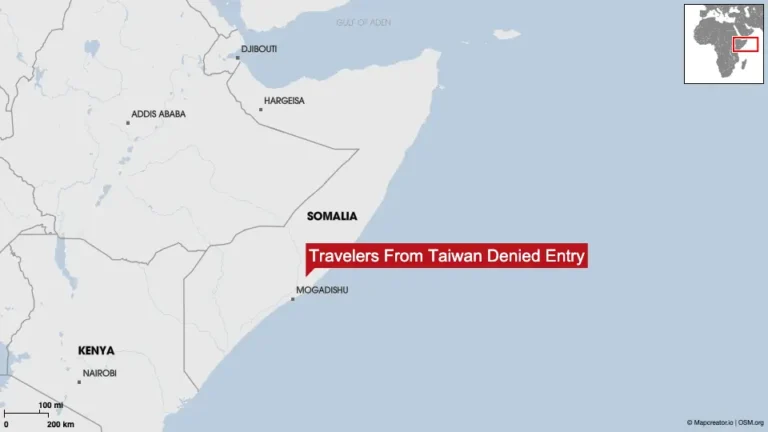Somalia has started blocking entry for holders of Taiwan passports, according to Taiwanese authorities. This move, which began on Wednesday, is seen as part of China’s growing influence in the region. Taiwan claims that China pressured Somalia to restrict travel by Taiwanese citizens. The decision comes as Taiwan strengthens its relationship with Somaliland, a breakaway region of Somalia that declared independence in 1991.
Background on the Situation
Taiwan, officially known as the Republic of China (ROC), operates as a self-ruled island but is claimed by China as part of its territory. Over the years, Taiwan has faced increasing diplomatic isolation, largely due to China’s aggressive stance against recognizing Taiwan as a sovereign nation. While many countries around the world maintain unofficial ties with Taiwan, Beijing has pressured countries to avoid formal recognition or diplomatic relations with the island.
In the case of Somalia, Taiwanese authorities have suggested that Beijing’s influence led to the decision to block travelers with Taiwan passports. While Somalia has not officially confirmed China’s role, the timing of the ban coincides with rising Chinese efforts to limit Taiwan’s international presence.
Taiwan’s Growing Ties with Somaliland
The diplomatic move also comes at a time when Taiwan is deepening its relations with Somaliland, an autonomous region in northern Somalia. Somaliland declared its independence from Somalia in 1991, although it has not been recognized by the international community. Despite this, Taiwan has increasingly shown support for the region, which has further strained relations between Somalia and Taiwan.
Somaliland’s leadership has expressed interest in fostering closer ties with Taiwan, seeing it as a potential ally for development and international support. This move has prompted Somalia to strengthen its relations with China, which has long held a strong stance against Taiwan’s international recognition.
China’s Influence in Africa
China has been increasing its diplomatic and economic reach across Africa, using a combination of trade deals, investments, and political pressure to sway African countries. China’s Belt and Road Initiative (BRI), which focuses on infrastructure development in various countries, has played a key role in expanding Beijing’s influence across the continent. In exchange for investments and aid, many African nations have backed China’s position on Taiwan.
For Somalia, China is a critical economic partner, especially in areas like infrastructure and trade. It is believed that Beijing may have used its influence to press Somalia to take action against Taiwanese travelers as part of its broader efforts to isolate Taiwan internationally.
Reaction from Taiwan and International Community
Taiwan’s foreign ministry condemned Somalia’s decision, calling it an attempt to limit the island’s international space. Officials in Taiwan have also accused China of bullying smaller nations to act in Beijing’s interest. The Taiwanese government has not indicated what actions it will take in response, but the situation highlights the ongoing struggle Taiwan faces in maintaining its diplomatic relations amidst Chinese pressure.
Meanwhile, international reactions to the decision have been mixed. While some Western countries have expressed concern over China’s influence in the matter, others have chosen to remain neutral, highlighting the complex geopolitics surrounding Taiwan’s status.
The Future of Taiwan-Somaliland Relations
Taiwan’s increasing support for Somaliland may be seen as an effort to gain diplomatic leverage in Africa. Despite the lack of formal recognition, Taiwan’s engagement with Somaliland could provide it with an important partner in the Horn of Africa, a region of strategic importance. For Somaliland, the growing ties with Taiwan could mean increased access to economic aid, international support, and infrastructure projects that would aid in the region’s development.
However, the relationship could complicate matters with Somalia, which still claims Somaliland as part of its territory. The decision to block Taiwan passport holders’ entry to Somalia is likely a direct response to Taiwan’s growing ties with Somaliland. The situation is a reminder of the ongoing complexities in the region, where local, regional, and international politics often collide.
What’s Next?
As tensions rise between Somalia, Taiwan, and China, the situation remains fluid. Taiwan has promised to monitor developments closely and continue to support Somaliland in its quest for international recognition. Somalia, on the other hand, faces pressure from China to align more closely with Beijing’s stance on Taiwan, while also dealing with internal challenges related to the region’s stability.
The ongoing diplomatic standoff highlights the delicate balance that many nations in Africa must strike between their relationships with China and their support for Taiwan. The coming months will likely see further developments as both Taiwan and Somaliland seek to expand their influence in Africa, while Somalia navigates its position between two powerful actors on the world stage.







